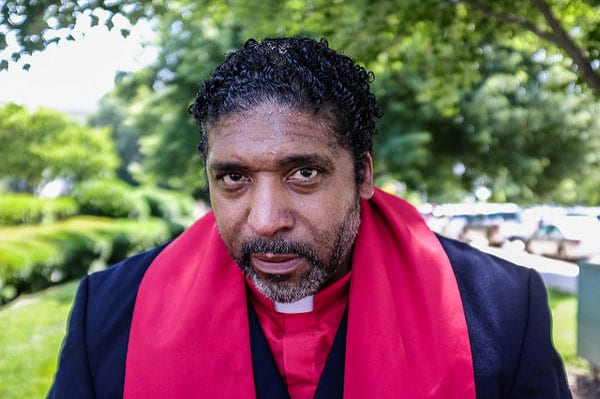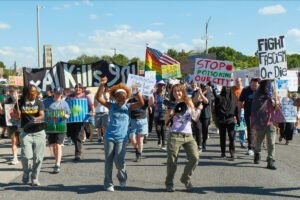
November 13, 2018; CityLab
Speaking at the Schomburg Center for Research in Black Culture earlier this month, Reverend William Barber II, leader of the Moral Mondays campaign in North Carolina, according to CityLab, stressed the reality that poverty and economic inequality hit all segments of the population: “If you are white, or you are black, or you are red, or you are yellow, or you are brown, and you don’t have enough money to pay your light bill, we’re all black in the dark.…That is why a true revolution…cannot just be a black movement. It has to be a black, brown, white movement that takes race and poverty together.”
This is hardly a new notion. It is one that has been raised by many Black leaders in the past, including not just Martin Luther King but Malcolm X and the original Black Panther Party. Using race as a divisive tool helps keep the economic power structure in power. Rev. Barber notes that the stance is not without its critics. He told CityLab:
When we go in these Southern states, we have these audiences of all different races, creeds, and colors when they come in. Many of them are still thinking “silo.” By the end of our training, they say, “Oh, voter suppression is not just a black issue. It’s targeted at black people, but in actuality, all of the people getting elected by voter suppression then turn around and use that power to implement policies that in raw numbers hurt mostly white people.”
If we don’t talk like that and show that, we enable the Trump and the [Mitch] McConnell and the [Paul] Ryan-type of vision, as you say.
Sign up for our free newsletters
Subscribe to NPQ's newsletters to have our top stories delivered directly to your inbox.
By signing up, you agree to our privacy policy and terms of use, and to receive messages from NPQ and our partners.
You can’t build a fusion movement without the disaggregation of the numbers. There are progressives saying, “Well, we don’t want to disaggregate the numbers, because we don’t want people to think we are dismissing the traumatic reality of black poverty.” I say, “Do you think I’m trying to dismiss the traumatic effects of black poverty?”
What I’m trying to do is beat the poverty. You’re not going to beat it until you show all people that they have been impacted by it. When we started disaggregating the numbers, we would go to audiences and say, “66 percent of black folks are living in poverty, and 37 percent of white people. But watch this: Did you know that that 37 percent of white people is something like 40 million more people than African Americans?” That allows us to get a black mother from the Delta of Mississippi in the same room with a white mother from West Virginia, or to get black inner-city citizens from Louisville in the same room with white coal miners and working people from Eastern Kentucky.
Barber is devoted to a strategy that focuses on deeper systemic change directed at how wealth is acquired and concentrated, changes that will require political power. Rev. Barber connects the effort to divide and conquer with the ongoing battle to ensure that all voters can vote.
Ever since the Constitution was written there were some who said certain people cannot vote. Poor white people and white men without land, Native American, Women and Black people. Ever since the 15th Amendment and the 14th Amendment were written, the deconstructors of democracy have always feared black and poor white people voting together and hooking up…All of the states that have passed voter suppression laws have elected politicians who cut taxes for the wealthy, who are against workers’ rights, who are against insurance and immigrants, against gay people and public education.
Going forward, building efforts that help people see that their common interests will be key to effecting meaningful change that addresses the growing impact of the economic divide and government policies that do not address real human needs. For the PPC, according to Barber, this means organizing everywhere. “We’re going to be canvassing, deliberately going into poor and impacted communities…where poor and impacted people are and where their votes, if organized, could make a difference. Our movement has just begun.”—Martin Levine












